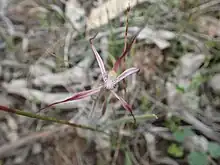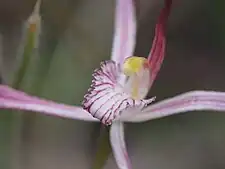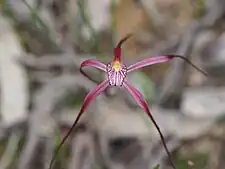| Ruby spider orchid | |
|---|---|
 | |
| Caladenia occidentalis growing in Cockleshell Gully near Leeman | |
| Scientific classification | |
| Kingdom: | Plantae |
| Clade: | Tracheophytes |
| Clade: | Angiosperms |
| Clade: | Monocots |
| Order: | Asparagales |
| Family: | Orchidaceae |
| Subfamily: | Orchidoideae |
| Tribe: | Diurideae |
| Genus: | Caladenia |
| Species: | C. occidentalis |
| Binomial name | |
| Caladenia occidentalis | |
| Synonyms[1] | |
Caladenia occidentalis, commonly known as the ruby spider orchid, is a species of orchid endemic to the south-west of Western Australia. It has a single erect, hairy leaf and one or two pinkish-red flowers with a white, red-striped labellum.


Description
Caladenia occidentalis is a terrestrial, perennial, deciduous, herb with an underground tuber and a single erect, hairy leaf, 100–150 mm (4–6 in) long and 3–4 mm (0.1–0.2 in) wide. One or two pinkish-red, white or pink flowers 50–80 mm (2–3 in) long and 50–70 mm (2–3 in) wide are borne on a stalk 150–300 mm (6–10 in) tall. The sepals and petals have long, reddish, thread-like tips. The dorsal sepal is erect, 40–60 mm (1.6–2.4 in) long and about 2 mm (0.08 in) wide. The lateral sepals are 40–60 mm (1.6–2.4 in) long, about 3 mm (0.1 in) wide and horizontal near their bases, then turn downwards and finally droop. The petals are 35–50 mm (1–2 in) long, about 3 mm (0.1 in) wide and arranged like the lateral sepals. The labellum is 8–12 mm (0.3–0.5 in) long, 6–9 mm (0.2–0.4 in) wide and creamy-white with red lines or spots. The sides of the labellum have short, blunt teeth, and the tip is curled under. There are two rows of cream to pinkish, anvil-shaped calli along the centre of the labellum. Flowering occurs from August to mid-October.[2][3][4]
Taxonomy and naming
Caladenia occidentalis was first described in 2001 by Stephen Hopper and Andrew Phillip Brown from a specimen collected near Mandurah and the description was published in Nuytsia.[1] The specific epithet (occidentalis) is a Latin word meaning "western"[5] referring to the distribution of this species.[3]
Distribution and habitat
The ruby spider orchid occurs between Bunbury and Arrowsmith in the Geraldton Sandplains, Jarrah Forest, Murchison and Swan Coastal Plain biogeographic regions where it grows in woodland and on the edges of seasonal swamps and lakes.[2][3][4][6]
Conservation
Caladenia occidentalis is classified as "not threatened" by the Western Australian Government Department of Parks and Wildlife.[6]
References
- 1 2 3 "Caladenia occidentalis". APNI. Retrieved 24 February 2017.
- 1 2 Jones, David L. (2006). A complete guide to native orchids of Australia including the island territories. Frenchs Forest, N.S.W.: New Holland. p. 107. ISBN 1877069124.
- 1 2 3 Brown, Andrew; Dundas, Pat; Dixon, Kingsley; Hopper, Stephen (2008). Orchids of Western Australia. Crawley, Western Australia: University of Western Australia Press. p. 66. ISBN 9780980296457.
- 1 2 Hoffman, Noel; Brown, Andrew (2011). Orchids of South-West Australia (3rd ed.). Gooseberry Hill: Noel Hoffman. p. 53. ISBN 9780646562322.
- ↑ Brown, Roland Wilbur (1956). The Composition of Scientific Words. Washington, D.C.: Smithsonian Institution Press. p. 853.
- 1 2 "Caladenia occidentalis". FloraBase. Western Australian Government Department of Biodiversity, Conservation and Attractions.